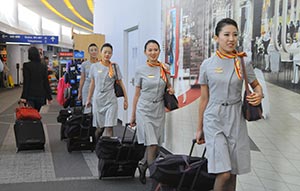

Zhejiang province, for example, faced a problem.
In the first half of 2013, 4 million inbound travelers visited the province, up just 0.7 percent but, nonetheless, up. The number of Asian visitors fell but other regions saw rises, according to local tourism authorities.
High-end hotels in the province were affected seriously.
The total revenue of five-star hotels in Zhejiang province in the first half of 2013 fell by 14.7 percent compared with last year. The average rental rate was 597.80 yuan ($98), down 4.2 percent.
However, hotel groups will continue to build new hotels in China despite the latest figures, business insiders said.
"If we stop, other groups will continue adding rooms," said Michael Stevens, deputy president of Wanda Hotel and Resorts Co Ltd.
Taking a good share of the hotel market is one of the reasons for the hotel group' expansion, he added.
China is not the only destination Kijkanakorn put her eyes on. She is also planning new hotels in other neighboring countries, such as Cambodia and Myanmar, where inbound tourism is growing at a high speed.
In 2012, the Asia-Pacific region recorded 232.9 million international tourist arrivals and was the fastest growing region for the second year in a row, with a 7 percent increase in tourism arrivals from 2011, according to the World Tourism Organization.
Thailand also enjoyed a 16-percent year-on-year increase in tourist arrivals in 2012 and the country attracted foreign business in hospitality.
Explaining why she gave up a good career in finance, Kijkanakorn, who has a bachelor of arts in marketing from the University of Texas and an MBA in international business from the University of South Carolina, said she simply missed Thailand. She was speaking during a laughter-filled delicious lunch at one of her first boutique hotels, the award-winning Aleenta Resort and Spa Phuket-Phang-Nga, overlooking a virtually deserted golden beach.
Many years ago, Kijkanakorn's grandparents moved to Thailand to set up various businesses. She spent many a happy holiday near this very spot in a beachside home her parents owned.
Kijkanakorn started her working life in hospitality after holding several leadership roles specializing in auditing, consulting, mergers and acquisitions and financial control, managing at one time 12 teams in Asia, Europe and the United States.
"Thailand to me has always been the leading country in terms of hospitality and hotels," she said.
As an indication of her instinctive abilities, Aleenta was voted one of the world's best resorts by readers of the industry "bible" Conde Nast Traveler US in its first year of operations.
"I guess it was one of those ignorance is bliss things," she admitted. "I didn't know anything about the hotel business."
She said she thought she could just get into it and have a retirement plan based on a 10-room hotel.
"I thought I would do just fine sitting on the beach with my guests, drinking cocktails," she said.
The best thing that ever happened to Thailand was that movie called Lost in Thailand, which was low budget but hugely popular in China.
"So that meant big margins. I love big margins," she added.
 Models at Ford pavilion at Chengdu Motor Show
Models at Ford pavilion at Chengdu Motor Show
 Brilliant future expected for Chinese cinema: interview
Brilliant future expected for Chinese cinema: interview
 Chang'an launches Eado XT at Chengdu Motor Show
Chang'an launches Eado XT at Chengdu Motor Show
 Hainan Airlines makes maiden flight to Chicago
Hainan Airlines makes maiden flight to Chicago
 Highlights of 2013 Chengdu Motor Show
Highlights of 2013 Chengdu Motor Show
 New Mercedes E-Class China debut at Chengdu Motor Show
New Mercedes E-Class China debut at Chengdu Motor Show
 'Jurassic Park 3D' remains atop Chinese box office
'Jurassic Park 3D' remains atop Chinese box office
 Beauty reveals secrets of fashion consultant
Beauty reveals secrets of fashion consultant